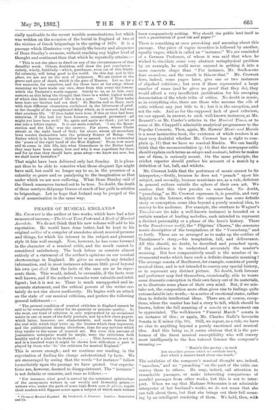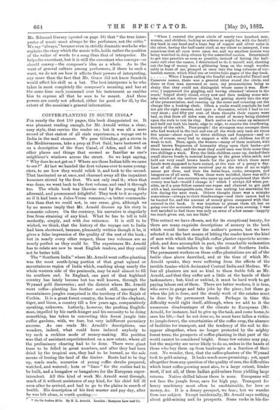PHASES OF MUSICAL ENGLAND.*
MR. CROWEST is the author of two works, which have had a fair measure of success,—Thu Great Tone Poets and A Book of Musical Anecdote. We do not think that his new volume will add to his reputation. He would have done better, had he kept to his original metier of a compiler of anecdotes about musical persons
and things, for which his interest in the subject and pleasant style lit him well enough. Now, however, he has come forward in the character of a musical critic, and the result cannot be considered satisfactory. The book before us consists almost entirely of a statement of the author's opinions on our musical shortcomings in England. He gives us scarcely any detailed information, and in most instances advances little proof beyond his own ipse di.eit that the facts of the case are as he repre- sents them. This would, indeed, be excusable, if the facts were well known, and if the author's remarks were valuable and intel- ligent; but it is not so. There is much unsupported and in- accurate statement, and the critical powers of the writer cer- tainly do not rise above mediocrity. He begins with an attack on the state of our musical criticism, and prefers the following general indictment :--
" The present condition of musical criticism in England cannot be said to be remarkable either for its quantity or genuine quality. At the most, our fund of criticism is only represented by an occasional notice in one or more of the daily journals, and by a few class papers, which latter, however, are characteristic, and more famous for the seal with which they' write up the houses which they represent, and the publications issuing therefrom, than for any services which they render to the cause of musical art. But even this amount of journalistic enterprise would be ample, were the criticisms both
healthy and of a kind to be desired This, however, is not so, and in a hundred ways it might be shown how ridiculous a part is played by those who do' the criticism for musical England."
This is severe enough ; and we continue our reading, in the expectation of finding the charge substantiated by facts. We are encouraged by seeing that the words "for instance" follow immediately upon the passage we have quoted. Our expecta- tions are, however, doomed to disappointment. The " instance " is not definite or concrete, and runs as follows :—
" For instance, what good is served by the untutored splutterings of the anonymous writers in our weekly and bi-weekly prints,— writers who, under the garb of some high-flown noes de plume, regale their readers with flippant notes upon a subject of which such writers • Phases of Musical England. By Frederick J. Crowed. London: Remington and Co.
know comparatively nothing. Why should the public lend itself to such a prostitution of good ink and paper F"
There is something at once provoking and amusing about this passage. One piece of vague invective is followed by another, equally vague, which is called an " instance." We are reminded of a German Professor, of whom it was said that when he wished to elucidate some very abstract metaphysical problem by an example, he could never succeed in getting it into a more concrete shape than " For instance, Mr. Such-a-one does so-and-so, and the result is this-or-that" Mr. Crowest, does, indeed, some pages later, give one or two instances of slipshod criticism ; but even if these represented a large number of cases (and he gives no proof that they do), they would afford a very insufficient justification for his sweeping denunciation of the whole tribe of critics. No doubt in music, as in everything else, there are those who assume the rdle of critic without any just title to it ; but it is the exception, and not the rule. And as for the supposed lack of good criticism, we can appeal, in answer, to such well-known instances as Mr.
Bennett's or Mr. Corder's articles in the Musical Times, or to some of Mr. Chappell's admirable analytical programmes to the Popular Concerts. Then, again, Mr. Haweis' Music and Morals is a most instructive book, the existence of which renders it at least very doubtful whether Mr. Crowest has a right to com- plain (p. 11) that we have no musical Ruskin. We can hardly think that the recommendation (p. 14) that the newspaper critic should explain such terms as adagio and andante, before he makes
use of them, is seriously meant. On the same principle, the cricket reporter should preface his account of a match by a.
definition of bat, ball, and wickets.
Mr. Crowest holds that the performer of music cannot be its interpreter,—firstly, because he does not " preach " upon his subject, and secondly, because musicians are, as a rule, deficient in general culture outside the sphere of their own art. We confess that this view puzzles us somewhat. No doubt, " preaching," as Mr. Crowest expresses it, is possible, and very helpful to the listener, where the composer has some definite story or conception, some idea beyond a purely musical idea, to convey to his audience. For example, the overture to Wagner's Tan aliiiuser (to take a well-known instance) is founded on a certain number of leading melodies, each intended to represent a distinct personality or a phase of the hero's history. There is the Tannlaiuser motif, the " Pilgrims' Chorus," the sensuous music descriptive of the temptations of the " Venusberg," and so forth. These are so arranged as to make up the outline of Tannhauser's story,—his temptation, fall, and deliverance. All this should, no doubt, be described and preached upon, if the audience is to understand accurately the master's meaning. But how comparatively small is the number of in- strumental works which have such a definite dramatic meaning I The average sonata of Beethoven, for example, consists of purely musical ideas, and is not intended to convey any special history, or to represent any distinct picture. No doubt, both listener and performer may find themselves, occasionally, able to weave some dramatic conception in their own fancy out of its materials, or to illustrate some phase of their own mind. But, if we mis- take not, the composition more often gives rise to feelings quite
untranslatable into words,—to a series of emotional states, rather than to definite intellectual ideas. There are, of course, excep-
tions, where the master has had a story to tell, which should be known, before the full meaning of a sonata or a movement can be appreciated. The well-known " Funeral March " sonata is an instance Of this ; or again, Mr. Charles Ilall6's favourite Sonata in E minor (Op. 90). Still, we repeat, as a rule, we have no clue to anything beyond a purely emotional and musical idea. And this being so, it seems obvious that it is the per- former of the finest musical susceptibility who will convey most intelligently to the less tutored listener the composer's meaning :—
" Music's like poetry ; in each Are nameless graces which no methods teach, And which a master-baud alone can reach."
The subtleties of the composer's musical thought are, indeed, "nameless," and no "preaching" on the part of the critic can convey them to others. He may, indeed, call attention to remarkable passages, or make interesting comparisons of parallel passages from other works, but this is not to inter- pret. When we say that Madame Schumann is an admirable interpreter of her husband's works, we do not mean that she can talk about them, but that she brings out their full mean- ing by an intelligent rendering of them. We hold, then, with Mr. Edmund Gurney (quoted on page 18) that " the true inter- preter of music must always be the performer, not the critic." We say "always," because even in strictly dramatic works he who explains the story which the music tells, holds rather the position of the writer of words to a song than that of interpreter. He helps the executant, but it is still the executant who conveys—or should convey—the composer's idea as a whole. As to the want of general culture among performers, if there be such a want, we do not see how it affects their powers of interpreting, any more than the fact that Mr. Grace did not know Sanskrit would affect his skill as a bat. The best interpreter is he who takes in most completely the composer's meaning, and has at the same time such :command over his instrument as enables him to express all that he sees to be meant. And these powers are surely not affected, either for good or for ill, by the extent of the musician's general information.

































 Previous page
Previous page